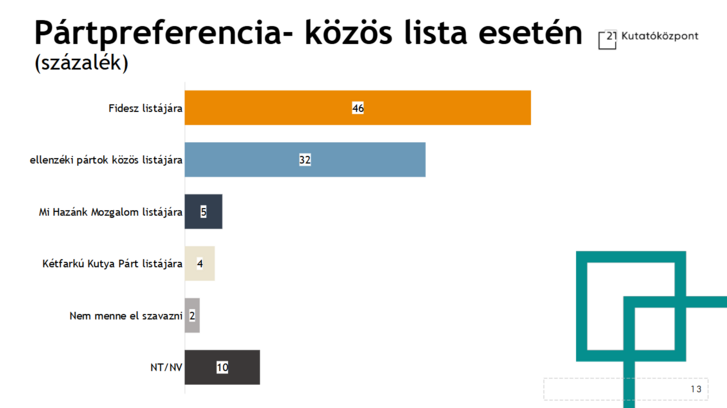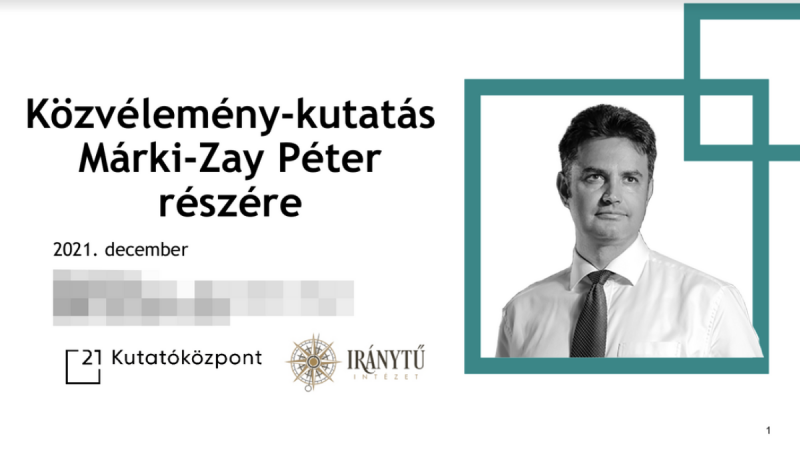The Index has obtained the details of the opinion poll, which is inconvenient for the opposition. We'll show you!
The Index obtained of the research were aired by 444 last week . According to the survey, 46 percent of the entire population supports the Fidesz-KDNP, while only about a third would vote for the opposition coalition. the Compass Institute, Mi Hazánk can count on 5 percent and the Kutyapár on 4 percent.
Did Márki-Zay know about it?
talked about research results Márki -Zay and the opposition . However, the most interesting expression from the point of view of the survey was that of Péter Márki-Zay, who stated that not a single penny was spent on the research, and also said that he did not receive the summary of the research (although Erzsébet Schmuck spoke to the contrary that it was the united it was ordered by the opposition's campaign staff). That is, despite the fact that
According to Márki-Zay, he only learned about the existence of the research from the press, according to the Index, the research was prepared personally for Péter Márki-Zay,
although it was not intended for the public, the portal writes.
American methodology, through 69 pages
The Index knows that the measurement recorded by the Compass Institute and 21 Research Centers (the data collection was carried out by the Compass by interviewing a sample of 2,000 people between December 6 and 11) was made with the help of American consultants, using American methodology. The margin of error of the measurement was indicated as plus or minus 2.2 percent, adding that it could be even higher in the case of partial populations.
The 69-page document explains in detail the essence of the so-called regression model, which can be used to find out, for example, which factors increase or decrease the probability of someone being a member of a particular group.

Source: Compass Institute
The research examined the correlations between gender, age, education, type of settlement, the regularity of internet use, but also how much the respondent is interested in politics, what their economic situation is, what they think if the opposition wins next year's parliamentary elections, what Looking forward to 2022, how was your financial situation in the past year and how much you agree with certain EU statements - although the report adds that not all of this information proved to be a significant factor.
Stable Fidesz and DK base
Regarding party preferences, the main findings of the research are as follows:
In the case of a joint opposition list, 46 percent would vote for the Fidesz-KDNP list, and 32 percent for the joint list of the opposition parties. Mi Hazánk 5, the Hungarian Kétfarkú Kutya Párt (MKKP), would receive 4 percent, 2 percent would not vote, and 10 percent could not or did not want to answer.
In the case of a separate list, Fidesz-KDNP would obtain 40 percent. Among the opposition parties, Jobbik 11, the Democratic Coalition (DK) 10, Momentum 7, MKKP 6, Mi Hazánk 5, the Mindinki Magyarországa Mozgalom (MMM) 3, the MSZP and the LMP would receive 2 percent each, Párbeszéd 1 percent. In this case, 5 percent answered that they would not go to vote at all, and 9 percent could not or did not want to give an answer.
Change of government or not?
According to the research obtained by the Index, among the entire population, the proportion of those who want a change of government was measured at only 43 percent, and those who did not were at 52 percent. The remaining 5 percent could not or did not want to answer. Median's figures previously showed that 48 percent of all respondents supported the Orbán government remaining in office after the elections, and only 43 percent voted for the need for a change of government in addition to the 9 percent who were undecided.
By the way, the main findings of the public opinion survey also include that
a significant number of opposition voters do not actually want a change of government and would not be expected to vote for the opposition on the joint list.
As a possible reason for this, the research indicated that many people feel that they would not do well financially. At the same time, among those who are uncertain, the opposition's reserve is greater than that of the governing parties, as 50 percent of them want a change of government, and only 30 percent said that they do not.
444 belonging to the Soros circle was the first to send the silk cord
As we have already reported, on Thursday 444 aired a research tabled by opposition politicians , according to which Fidesz is easily leading the united left. After the publication of the news, several of our readers came forward, saying that they had been called by the Compass Institute over the weekend. According to our information, the measurement was also aimed at determining whether the left-wing coalition or Márki-Zay should be highlighted during the campaign. more about this by clicking .
In connection with the research, our newspaper visited the Compass Institute on Friday. However, we received the answer from the organization that the series of numbers published on 444, which has since been linked to their Institute, "is not a research", so they cannot comment. about this by clicking .
The HVG also commissioned a study, but Márki-Zay could not be happy about that either
On Friday , a public opinion poll commissioned by the HVG and conducted by Median was made public. The institute conducted the survey by telephone interviewing a sample of 1,000 people, according to data published in the HVG weekly
48 percent of all Median respondents were in favor of the Orbán government remaining in office after the elections,
and only 43 percent voted for the need for a change of government, in addition to 9 percent who were undecided. Mandiner wrote more about the research conducted by Median .
Due to the declining popularity of Márki-Zay, thinking about his possible replacement began
After the above-mentioned researches, Péter Márki-Zay said: in his opinion, it is already conceivable that the left will come up with a change of Prime Minister candidate. "There are tools if someone wants to overthrow the opposition from within for the sake of Fidesz," he said in an interview , adding that he thinks the poll published by 444 could have been a tool for this.
Left: It's time to take stock of the results of the period since the primary election
According to our information, the list of possible candidates has already begun on the left, in case the air around Márki-Zay runs out for good. After Márki-Zay's statement, several of our left-wing sources spoke about the fact that it is really time to take stock of the results of the period since the primary election, the success of Márki-Zay's campaign. As one of them put it: "such a confrontation will certainly not provide arguments in favor of Márki-Zay's further candidacy".
According to an analyst we interviewed, Márki-Zay is only running ahead by floating the plans for his eventual replacement.
With this, he wants to strike a preemptive strike against the plans of those who are dissatisfied with him due to his falling popularity.
The Századvég survey also cast doubt on the chances of the left-wing prime ministerial candidate
As we briefly reported above, the latest survey by Századvég suggests that Péter Márki-Zay's popularity is constantly decreasing. According to the December public opinion poll of Századvég, 36 percent of those interviewed spoke favorably of Péter Márki-Zay and 56 percent unfavorably. This series of data also supports the research carried out specifically for Márki-Zay according to the Index, which showed a 14 percent advantage for the government party over the united left-wing list.
The Századvég survey also revealed that Márki-Zay's popularity has significantly decreased since the opposition primary election, as in October - during the second round of the primary election - 42 percent of voters still had a favorable opinion of Péter Márki-Zay, and 47 percent judged him unfavorably. about the results of Századvég's research by clicking here .
Featured image: Compass Institute












